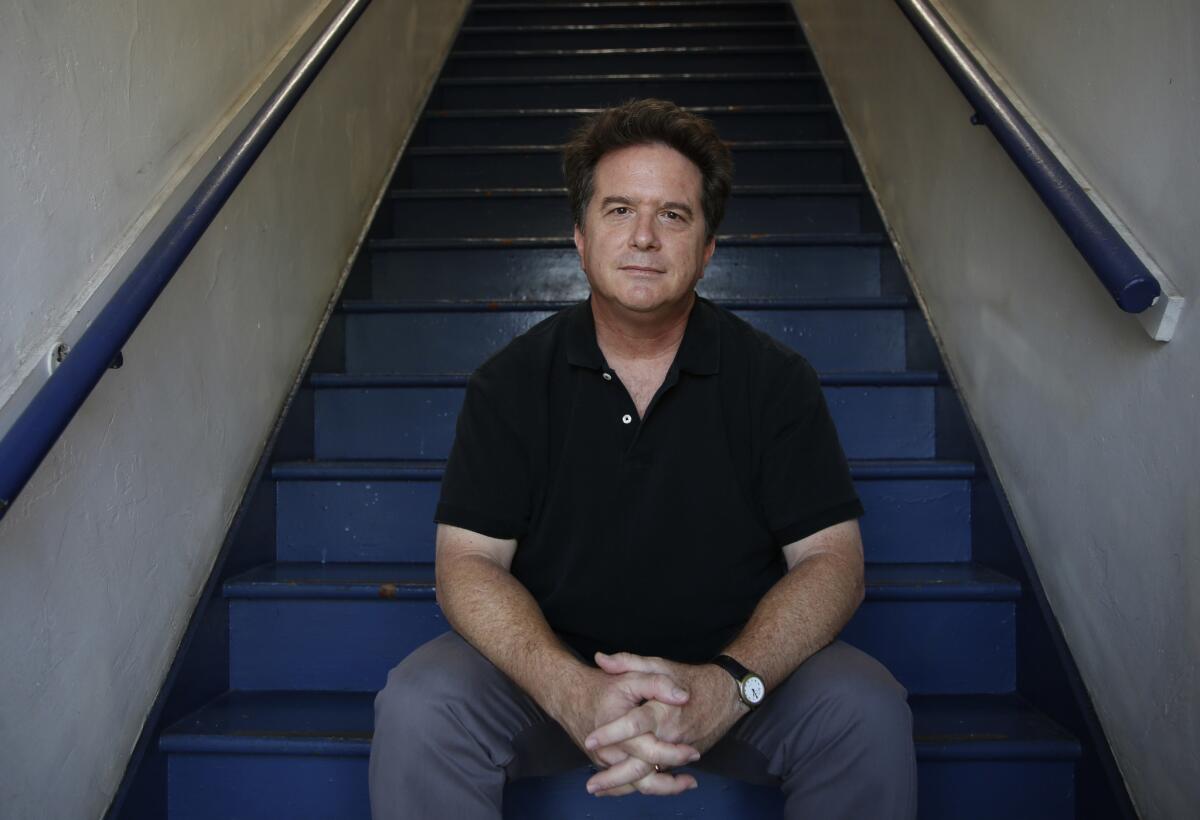Hope amid heartbreak: Why some theaters see light at the end of a coronavirus tunnel

- Share via
When Gov. Gavin Newsom ordered the cancellation of large, nonessential gatherings in an attempt to limit the spread of COVID-19, California’s theater companies were plunged into an involuntary, indefinite intermission. Productions and rehearsals were abruptly suspended or canceled outright, creating an unsettling state of limbo.
The region’s largest and most important nonprofit company, Center Theatre Group, suspended all productions until fall and furloughed half of its staff. How long can its smaller counterparts hold on before they become casualties of the pandemic?
To find out, The Times spoke with directors of five companies of various sizes from different parts of Southern California. They responded with a combination of grim determination and cautious optimism.
“We’re planning on getting through this,” said Stephen Sachs, co-artistic director of the Fountain Theatre in East Hollywood. “It’s going to be very hard, but we’re definitely coming out the other side.”
At the same time, he warned that the shutdown “will be devastating for many intimate theaters —operations that don’t have the financial stability and broad audience base that the Fountain Theatre has. I’m concerned about their future. It’s a precarious business.”
For now, the Fountain continues to pay its five full-time and four part-time employees. The similarly small staffs of Antaeus Theatre Company in Glendale and Rubicon Theatre in Ventura also remain on the payroll. Through furloughs and reduced hours, South Coast Repertory, Orange County’s flagship professional theater, has reduced its full-time staff from 75 to about 45.
But the five-person staff of the Odyssey Theatre, the three-stage venue in West Los Angeles that celebrated its 50th anniversary last year, has been laid off.
“That includes me,” said artistic director Ron Sossi, who was forced to shut down two shows, as well as two more that were in rehearsal. “We’re all on unemployment.”
That more drastic response reflects the fact the Odyssey operates under a different funding structure than the other theaters.
“We survive on ticket sales,” Sossi said, noting that box-office revenue constitutes 75% of its $750,000 annual budget.
In contrast, box office is just 20% to 40% for the other companies contacted for this article. The bulk of their budgets, from the Fountain’s $800,000 to South Coast Rep’s $11.4 million, comes from grants and donations, as well as other earned income such as classes.
“The Fountain is more fortunate than some theaters in that we own our building outright, and we have accumulated a cash reserve fund over the years for emergencies just like this,” Sachs said. “Between pulling from that fund and a number of grants that will be coming in over the coming months, we’re planning on getting through this.”
Antaeus does not have a reserve fund, but Executive Director Ana Rose O’Halloran is similarly looking to foundations for short-term help. She noted that several have already agreed to let money allocated for particular projects go into the theater’s general fund.
“One was for a specific show, ‘The Time of Your Life,’” she says. “If that show goes on, we’ll use it for that, but they’ve told us that if it doesn’t, we can use it to pay the rent.”
While that sort of flexibility will give theaters needed breathing space, administrators worry that gifts and grants could dry up if economic fallout from the virus is as bad as many fear.
“Donors are in a wait-and-see pattern,” O’Halloran said. “They’re probably waiting to see how much they are getting hit in the stock market.”
The Fountain has been forced to reschedule its June 30 anniversary gala fundraiser, but Sachs noted that many people have already pledged money for that event, and “So far, everyone is leaving their donations in place.”
O’Halloran pointed to another sign of solidarity. Her company gave patrons holding tickets to canceled shows several options and most chose to exchange them for future shows or to donate the cost of their tickets back to the company. Relatively few requested refunds.
“That was fortunate,” she said. “It minimized the amount of money we had to pay back at this difficult time.”
Paula Tomei, managing director of South Coast Rep, reported the same dynamic at her company. Her box-office staff, which is working from home, told her that most subscribers are not only supportive, they’re also staying on the line longer than usual to chat. “People are isolated,” she said. “They’re grateful for the conversation.”
After some internal discussion, South Coast Rep announced its 2020-21 season on March 16 — four days after the forced shutdown.
“It’s early days, but we have had renewals coming back,” Tomei said. While she found that encouraging, she was well aware of the uncertainty ahead.
“The one thing we can all agree on is we just don’t know what to expect,” she said. “Just a few weeks ago, we were working on our second-quarter budget reviews, projecting year-end numbers. Those numbers are completely irrelevant right now!”
The data are more dire for Karyl Lynn Burns, producing artistic director of the Rubicon in Ventura. Much like individuals, theaters who were suffering from pre-existing conditions are having a tougher time dealing with the effects of the novel coronavirus, and Rubicon falls into that unfortunate category. The company only recently crawled out of a financial hole caused by the devastating Thomas fire in Ventura and Santa Barbara counties in December 2017.
Burns said the Rubicon lost 600 subscribers, many of whom were among those whose homes were damaged or destroyed in the blaze. “Of those 600, we’ve only gotten about 100 of those people back,” she said. Some new subscribers have helped to fill the void, but many former subscribers have moved away or are still recovering from the fire, she said.
Between that loss, significant smoke damage to the theater and a shortened run of a profitable Christmas show, the company went into the red for the first time in seven years.
“We were just rounding the corner when this hit,” Burns said. “Now we have 15 weeks of no earned income.”
Lauren Gunderson gets thousands to tune in to her free playwriting class. “Straight White Men” writer Young Jean Lee leads her free class this weekend.
Burns is searching for emergency support from governmental agencies and pleading for help. Like many of her colleagues, she is hoping to be able to reopen in July — she has moved two spring shows to new summer dates — but she concedes that in the interim, “Cash flow will be a challenge.”
Of course, even if theaters can reopen in the summer, it’s impossible to say whether audiences will feel it’s safe to return.
“Once we get the all clear, and we’re able to come out of our caves, what will the theater landscape look like?” Sachs asked. “What will our audience base look like? How quickly will they come back? Will they have the financial means to do so? There’s a lot to worry about.”
Sossi said the Odyssey can survive a shutdown that lasts through the fall and perhaps beyond. He mused about what kinds of shows audiences will want to see once the crisis subsides. He suspected that in the wake of tragedy, they will be hungry for serious plays that address moral values and the meaning of life.
The trick for theaters at this fraught time is to think creatively about these long-term questions while juggling funds to stay afloat now.
“We keep dealing with this moment, because we have to, but we’re keeping our eyes on the future as well,” Tomei says. “Because we will be back.”
Playwrights at Skylight Theatre and 24 Hour Plays are taking inspiration from the virus that has temporarily shut down the theater industry.
More to Read
Updates
12:56 p.m. April 7, 2020: This article has been updated to reflect recent cutbacks to staffing at South Coast Repertory.
The biggest entertainment stories
Get our big stories about Hollywood, film, television, music, arts, culture and more right in your inbox as soon as they publish.
You may occasionally receive promotional content from the Los Angeles Times.










